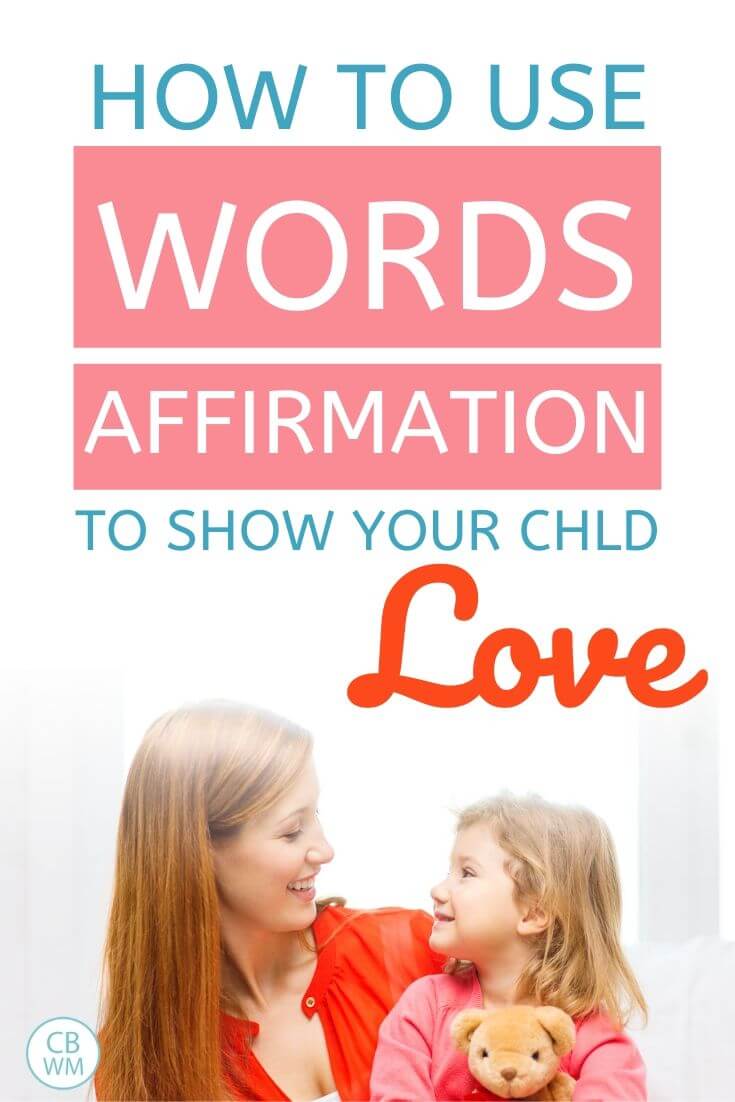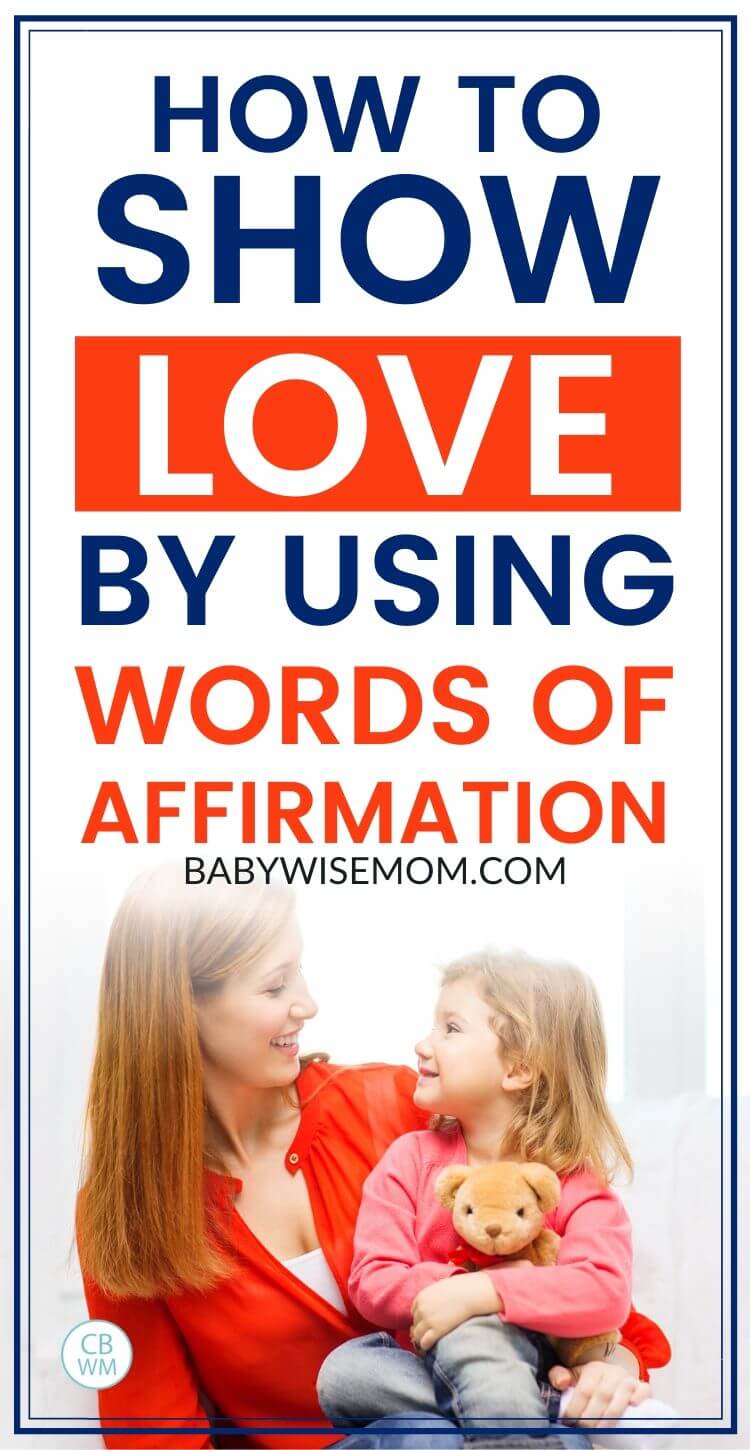Words of Affirmation is one of the five main ways to show your child love. Learn how to show love through words of affirmation and help your child feel loved.

The book The 5 Love Languages of Children, by Gary Chapman and Ross Campbell, discusses five different ways children feel love.
The first way discussed in the book is physical touch. The second way is Words of Affirmation.
Showing someone love through their primary love language is how you keep their “love tank” full. This makes it so they can handle harder moments and also are able to look outside themselves and show love to others.
Post Contents
- What is Words of Affirmation
- How to Show Love Through Words of Affirmation
- Words of Affection and Endearment
- Words of Praise
- Words of Encouragement
- Words of Guidance
- Words of Affirmation Ideas
- Express Your Love
- Communicate in a Positive Way
- Write Down Positive Words
- Find 3 Times a Day to Affirm
- Focus on the Positive
- Apologize When Needed
- Stay Calm
- Concrete Ideas
- Conclusion
- RELATED POSTS
What is Words of Affirmation
If someone has Words of Affirmation as their primary love language, then the way they feel most loved is through positive communication.
So the meaning of words of affirmation is that people feel an emotional reaction to the communication they receive. Affirmation is supporting someone emotionally or encouraging. So your words are supportive and encouraging.
If you want to show someone with words of affirmation love language as their number one love language that you care about them, you keep words positive.
Words of Affirmation doesn’t only apply to children who can understand what you are saying. Chapman and Campbell point out that long before children understand the meaning words, they understand the tone of voice and can read body language.
My minor was in communications. A fascinating thing about communication is that less than 10% of the message communicated is through the actual words you say. The other 90% is through your body language, paralanguage, tone of voice, facial expressions, etc.
Words of Affirmation doesn’t mean you only say nice words and that your body language doesn’t matter at all. It all comes together to send a message.
>>>Read: Identifying Your Child’s Primary Love Language

How to Show Love Through Words of Affirmation
If you have a child who seems to feel love through words of affirmation, you are probably wondering how to show words of affirmation for children.
Words of Affection and Endearment
There are a few categories of words Chapman and Campbell suggest you focus on as a parent, the first being Words of Affection and Endearment.
Throw little pet names in the mix. Sweetie, honey, princess, etc. are all words that show endearment.
You can also combine your words with a smile, a hug, a pat on the head, a tickle, a high five…don’t depend on the word by itself because that is not the way communication works.
Words of Praise
The second category for words is Words of Praise.
“Praise…is for something over which the child has a degree of control” .
(page 47)
As you offer praise, you want it to be genuine. It is a good idea to use specifics over generalities.
Rather than saying, “You are a good girl” say, “You are a good girl for picking up your toys without being asked!”
Also, don’t give praise that isn’t true. Children know if something they did was so-so. If you lavish praise for the average, he might not believe sincere praise when it comes. You will have been like the boy who cried wolf and your child won’t believe your words.
You also don’t want to teach your child praise is necessary for every step–becoming addicted to and dependent upon praise.
Just make sure the praise is true and justified.
“Otherwise they may regard it as flattery, which they can equate with lying”.
(page 47)

Words of Encouragement
Another category for words is Words of Encouragement.
We want children to have the courage to try more. Remember that almost everything your child does in life is new to him. When you see your child do something right, tell him what he did and why it was good–why you value it.
An example from the book is if you see your child share. You would later tell your child that you noticed him share his toy with Bobby. Tell him you like that and why sharing is valuable.
The idea here is to catch your child doing something right and commend him for doing so. Words of encouragement are great for helping develop morals and ethics.
Chapman and Campbell caution that “The greatest enemy toward encouraging our children is anger” ( page 48). We must temper our anger. We must use quiet, soft voices. Speak pleasantly.
Is it easy? No–not always. Make the effort.
>>>Read: 7 Phrases To Help You Avoid Losing Your Temper as a Parent
Words of Guidance
The final category of words is Words of Guidance.
I think one of the most powerful statements in this book is this:
“All children are guided by someone”.
(page 50)
If you, the parent, do not step in to be that primary guide, something else will.
It might be the television. It might be school. It might be other adults, or perhaps other children.
I think we, as parents, all want that primary guider of our children to be us!
Correct guidance is for the benefit of the child, not to make the parent look good.
You don’t guide your children toward proper behavior in order to look like a great parent; you are teaching your children proper behavior because it is right and will help him in his life.
As you guide, you need to be sure you are a good example of what you are teaching. You also want your guidance to be overwhelmingly positive. Don’t focus so much on what they can NOT do as what they can.
Keep guidance as positive as possible.

Words of Affirmation Ideas
This is the love language of my husband and my three oldest children. This is the second love language discussed in The Five Love Languages of Children
If your child’s primary love language is Words of Affirmation, here are some tips to help you express love to your child:
Express Your Love
Say I Love You, and say it alone. Don’t tell our child you love him then ask him do to something.
Don’t tell your child you love him and follow that up with “but…” “I love you, but it is frustrating when you leave your shoes out every day.”
Leave “I Love You” as an unconditional statement.
This doesn’t mean you can’t ever ask your child to do something or tell him he shouldn’t do something. It means you don’t do so coupled with “I love you.” Leave “I love you” alone.
Communicate in a Positive Way
Keep communication positive. When your child does something right, praise and encourage without saying something like “it’s about time!”
Remember, the best way to hurt someone is to use their love language against them. If your child values words of affirmation, he will be more hurt by cutting words spoken in anger or frustration.
At Brayden’s 5th birthday, I had the family go around and say what they love about him. We had all of his grandparents and one great grandparent there, along with his sisters and my husband and me.
We all took turns saying what we loved about Brayden. He sat there with a shy little smile. I know he loved every minute of it.
So you can use your words as gifts.
Write Down Positive Words
Keep a journal. Chapman and Campbell suggest that if you have a hard time speaking words of affirmation, you keep a journal and write down positive words.
Record ones you hear from other parents, ones you read in books, and ones you think of on your own. Then look for opportunities to say these words to your child.
Find 3 Times a Day to Affirm
Use words of affirmation at least three times each day. Get in the habit of finding ways to give your child some words of affirmation.
Get yourself into the habit of showing love through your words. Maybe share something each morning, each mid-day, and each evening to get those 3 times in there.
Focus on the Positive
Do not lecture or condemn. Trust me when I say that with a person whose love language is words of affirmation, you will get a lot more reaction from focusing on what you like than what you don’t like.
With both my husband and my son, things go much better if I say nothing about what I am not liking and praise and encourage all that I do. They get that encouragement and they want to do more good.
Negative talk brings them down and seems to ruin all motivation.
Now, sometimes, yes, you do need to point out what is being done incorrectly. That will need to happen at times. Just make the effort to focus on positive talk and I promise you will see a world of difference.
Apologize When Needed
Apologize. If you say something hurtful, apologize for it and ask forgiveness. “…it is essential for parents and other significant adults in the child’s life to quickly apologize for negative, critical, or harsh remarks” (page 55).
Stay Calm
Don’t get angry. Keep your voice and emotions in check. Do not use your words as weapons.
Concrete Ideas
Now for some concrete ways you can use words to show love:
- Put a note in the lunchbox, backpack, pocket, etc.
- Mention specific things you see your child do that you like.
- Ask what your child wants to be when he grows up. Then comment on things about him that will make him a good XYZ.
- Record yourself telling your child how much he means to you.
- At special occasions, tell your child how much he means to you.
- Create a drawing or painting of what you love about your child.
- Display things your child has made or photos of things your child has made. Let your child know why you love it.
- If you aren’t home with your child, call your child randomly in the day just to say I love you.
- Have a special name of affection that is only for your child.
- Tell your child “I love you” consistently.
- Leave notes around the house to tell your child you love him.
- Share things you love about your child with others when your child is present.
- Create an encouragement jar. Drop notes of things you love about your child in it.
- When your child messes up, express in words that you knew of your child’s good intentions first.
- Keep a journal between you and your child where you write back and forth. Add words of affirmation to your communication back and forth.
- Make a calendar of words of affirmation as a gift. It can include things you like about that person as well as scriptures or good thoughts that are encouraging.
Conclusion
Again, remember that all children need to feel love in all five languages. Children need to be multi-lingual in the love languages. Even if your child doesn’t have this as a primary love language, work to have these tips as part of your life.
Who doesn’t love being told they are great?
RELATED POSTS
- Communication Skills
- Love Language: Acts of Service
- Love Language: Quality Time
- Love Language: Gifts
- How to Show your Child Love Through Physical Touch
- 3 Ways to Show Your Child Unconditional Love
 The 5 Love Languages of Chi...Shop on Amazon
The 5 Love Languages of Chi...Shop on Amazon
This post originally appeared on this blog in May of 2010
